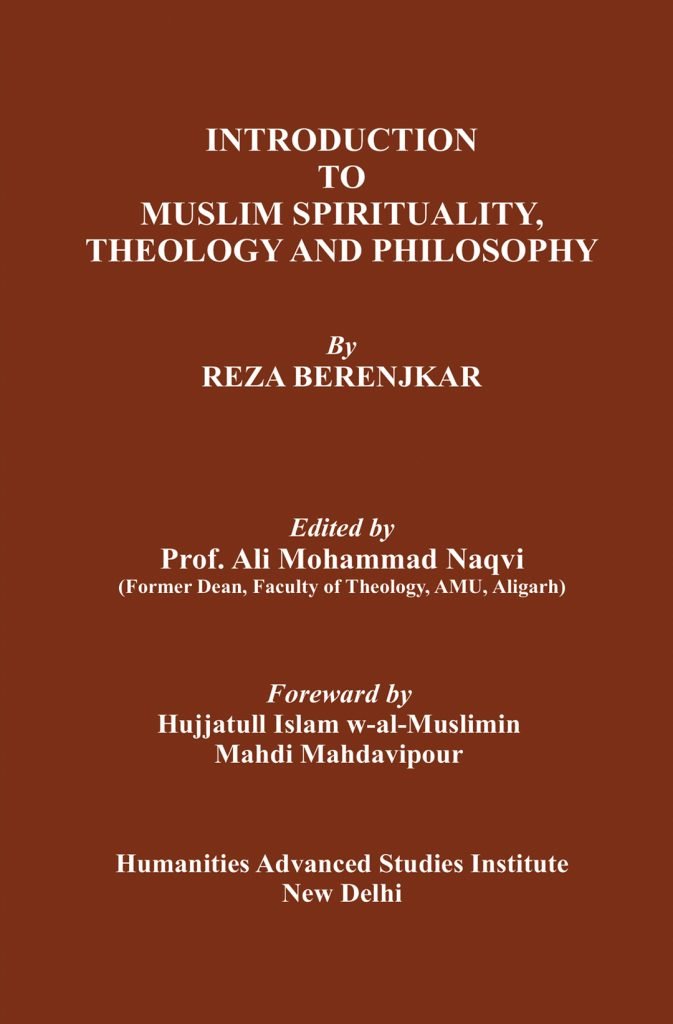
by: Dr. Reza Barajkār
Edition: First
Year of Publication: December 2023
Publisher: Humanities Advanced Studies Institute, New Delhi, India
Price: Rs 200/-
Total Copies: 500
Foreword
Written by Ustād Mahdī Mahdavīpour, the foreword sets the tone for the book, reflecting on the importance of understanding Islamic spirituality, theology, and philosophy in the modern world.
PART ONE: MYSTICISM AND SPIRITUALITY
Introduction to Mysticism
- Taṣawwuf and ‘Irfān: The book starts by defining these concepts, focusing on their literal and terminological meanings. ‘Irfān refers to spiritual knowledge, while Taṣawwuf is the practice of mysticism.
The Goal and Method of ‘Irfān
- Goal of ‘Irfān: The ultimate aim of mysticism is to achieve spiritual enlightenment and closeness to God.
- Method of ‘Irfān: Focuses on purification of the soul and practicing a deep connection with the Divine through discipline, worship, and reflection.
History of Taṣawwuf
The history is divided into Five Periods, detailing the evolution of Islamic mysticism from its early stages to its more structured development over time.
Mystical Theories
- Waḥdat al Wujūd (Monism): A key philosophical concept discussed is the oneness of existence.
- Difference in Views: There are differing perspectives among Mystics, Philosophers, and Theologians on the nature of God and existence.
Practical Mysticism (Irfān e ‘Amalī)
This section delves into the practical aspects of mysticism, emphasizing the balance between Sharī’at, Ṭarīqat, and Ḥaqīqat (Law, Path, and Truth), as well as spiritual states and stations.
PART TWO: KALĀM (Islamic Theology)
Introduction to Kalām
- Definition and Subject Matter: Kalām is the science of Islamic theology, discussing God, the universe, and the relationship between them.
- Emergence and Growth: The development of Kalām is traced back to the early Islamic debates on faith and reason.
Key Schools of Thought
- Mu’tazila: Known for their rationalist approach, they focused on the nature of God and human free will.
- Ashā’ira: They developed a more orthodox theology, emphasizing the absolute will of God.
- Māturīdīya: A school with a more moderate position, blending reason with traditional theology.
Shia Kalām
This section explores Imāmīya Kalām, the theological approach of the Shia, especially during the Ghaibah (occultation) period, where major Shia scholars like Sheikh Mufīd and Sayyid Murtaḍa shaped the discourse.
PART THREE: PHILOSOPHY
Introduction to Philosophy
- Definition of Philosophy: The study of fundamental questions about existence, reason, and ethics.
- Methodology: Islamic philosophers integrated Greek philosophy, particularly Aristotelian and Neoplatonic thought, into their works.
Key Philosophical Schools
- Peripatetic Philosophy: Explores the teachings of Kindī, Fārābī, and Ibn Sīnā (Avicenna), who contributed to logic, metaphysics, and the philosophy of mind.
- Illuminationist Philosophy: Introduced by Shihāb al-Dīn Suhrawardī, this school emphasized intuitive and mystical knowledge, contrasting with rationalist philosophy.
- Transcendental Philosophy: Mullā Ṣadrā’s groundbreaking work on existence and the nature of reality, especially focusing on the Unity of Being (Waḥdat al-Wujūd) and the substantial movement of existence, which shapes how the cosmos operates.
Concepts in Transcendental Philosophy
- Existence and Essence: The book covers the relation between existence (wujūd) and essence (māhīyah), as well as how they shape reality.
- The Theory of Substantial Movement: Discusses how all substances in the universe are in a constant state of motion and transformation.
- God and the Universe: Explores arguments for the existence of God and the interplay between the Divine and the natural world.
This book provides a comprehensive introduction to the mystical, theological, and philosophical traditions in Islam, offering insights into various schools of thought and their historical developments. The work emphasizes the importance of understanding these foundational aspects to appreciate Islamic intellectual heritage. Key concepts are clearly defined, and the historical evolution of thought is presented in a structured and accessible way.
Key Terms to Remember:
- Taṣawwuf (Mysticism)
- ‘Irfān (Spiritual Knowledge)
- Waḥdat al Wujūd (Monism)
- Kalām (Theology)
- Mu’tazila, Ashā’ira, Māturīdīya (Theological Schools)
- Peripatetic, Illuminationist, Transcendental Philosophy (Philosophical Schools)
Note: The content has been condensed into sections with bolded concepts for easy reference.
